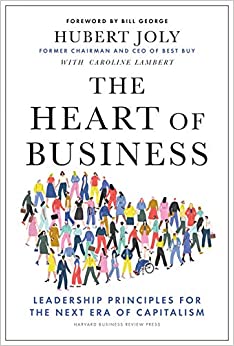The Heart of Business
Leadership Principles for the Next Era of Capitalism


Hubert Joly is the former chairman and chief executive officer of Best Buy Co Inc, the giant US electronics retailer, where he led the company's turnaround and transformed it into an industry leader. He is now a senior lecturer at the Harvard Business School and a member of the board at Johnson & Johnson and Ralph Lauren Corporation, as well as of the advisory board of the top French business school, HEC Paris.
Listen to Hubert speak with Roddy Millar in this Ideas for Leaders podcast
Joly took on the CEO role at Best Buy Co in 2012, when everyone believed the business was destined for bankruptcy and the job a poisoned chalice. Best Buy was seen to be at the wrong-end of the online battle, with large bricks-and-mortar retail stores and a management that was showing no nimbleness or agility. As a consequence the employee morale and general innovation and energy capacity of the business were at rock bottom. Joly had followed a successful career path from his early days as a McKinsey consultant in Paris, trained on the numbers and traditional commercial strategy approach. He followed this with a stint at Vivendi, followed by senior leadership roles at Carlson Wagonlit Travel, the owner of Radisson Hotels, TGI Fridays and other hospitality – and importantly – people-centred businesses.
It was here he started to see the power that running a People First strategy unleashes in a business – and what he immediately put to work at Best Buy Co with his Renew Blue initiative. He reinstated the employee perks that recent cost-cutting had removed, and started to build the business back-up from the frontline people first. There followed a long, hard road to recovery but it was led by the employees' energy and initiatives – and the power of the 'human magic' that they brought when they had space to act and trust placed in them.
Joly is one of those business people who has more depth than we tend to expect in corporate leaders these days. His shift from hard, accounting-led corporate strategy to a more holistic, purpose-led approach started quite early on in his career, through conversations with the French businessman, Jean-Marie Descarpentries who held leadership roles at Danone and Saint-Gobain, that initiated his journey. It was supported by spending time with some Jesuit monks who opened his eyes to the motivating force of having noble purpose.
The book starts with an exploration of the meaning of work, tracing its demonisation as a curse from Adam through to Sisyphus and medieval traders. The Aristotlean ideal of a life dedicated to contemplation and the pursuit of knowledge was long-seen as the counter to labour, hard or otherwise. But he points out, quoting Khalil Gibran that '..in keeping yourself with labour you are in truth loving life'; and that work has meaning in itself. In order to build enthusiasm and engagement it is necessary that everyone can experience that meaning. This is the core concept of the book – people will give of themselves if they feel they are being purposeful. It is therefore the leader's responsibility to ensure that that purpose is embraced and understood. He recites the story of the two medieval masons who were asked what they were doing: one answers 'I'm cutting stones' while the other says 'I'm building a cathedral', it is clear which has more energy and passion for his work.
Joly is clear that the singular focus on profit is wildly insufficient for instilling that noble purpose – and unleashing the consequent 'human magic'. Profit is a necessary part of a successful business, and without it nothing can happen, but it is not a sufficient end in itself to motivate and enthuse people. Indeed an obsessive focus on profit above all else, inevitably leads to the wrong metrics being measured, and unsustainable behaviours ensuing.
Joly distils the recipe for successful Purposeful Leadership down to five ingredients for Human Magic:
This book is a mixture of autobiography and case study, but predominantly it is an allegory to and pleas for better leadership – the cause that the author has pledged to promote for the rest of his working life.
There is a notable movement towards this style of people-centric leadership. Gary Hamel's Humanocracy is an academic's take on the approach; Talent Wins is the consultants', very senior ones, paean to focussing on your people before anything else; Everybody Matters by Bob Chapman is a very similar story and approach to Joly's, but with the difference that Chapman owned his business while Joly is 'just' an employee, albeit the most important one, but it was not his company to reposition in this way, he needed to carry everyone with him on the journey even more than Chapman had.
The transformation of Best Buy was an extraordinary feat, but as Joly positions it, one that was perfectly achievable with his Purposeful Leadership & Human Magic approach. The lesson for everyone else is that you do not have to own the business to do this, you do not even have to be the CEO – by focusing on your team and empowering them, while giving great clarity is a tried and tested way to get remarkable returns. No-one says it is easy but it is possible – if you put your heart into the business.
Title: The Heart of Business
Author/s Name/s: Hubert Joly, with Caroline Lambert
Publisher: Harvard Business Review Press
ISBN: 978-1-647-82038-1
Publishing Date: May, 2021
Number of Pages: 252
Author Knowledge Rating: 1-5 (based on their years of experience, academic expertise in subject areas, and exposure to cross-functional thinking in the area)

















































































Readability: 1-5 score(1=dense and v academic; 5=frantic; page turner)




































































































Appropriate Length: (1=could have been written in 25% of the length;5=could have been longer)


















































































Core Idea Value: (1=nonsense (or entirely esoteric); 5=game-changer)



































































































